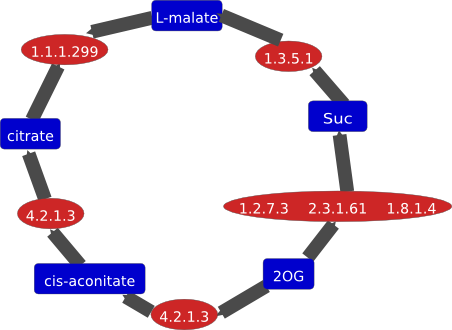EC Number   |
General Information   |
Reference   |
|---|
    2.4.1.186 2.4.1.186 | evolution |
glycogenin is a member of the GT8 family of glycosyltransferases with a GT-A architecture |
737167 |
    2.4.1.186 2.4.1.186 | evolution |
the Pacific oyster has three isozymes of glycogenin: CgGN-alpha, CgGN-beta, and CgGN-gamma. Functional motif architecture analysis shows that CgGN is structurally similar to mammalian glycogenin-1. All three CgGN isoforms contain the key domain of glycosyltransferase and the C-terminal domain |
759384 |
    2.4.1.186 2.4.1.186 | evolution |
unlike mice, humans and other primates have a second variant of glycogenin called glycogenin-2, which is mainly expressed in the liver |
759024 |
    2.4.1.186 2.4.1.186 | malfunction |
analysis of GYG2 deletion phenotype and effects on glucose metabolism and/or glycogen synthesis, GYG2 deletion mutant phenotype overview, liver histopathology and enzyme expression level, overview |
736558 |
    2.4.1.186 2.4.1.186 | malfunction |
complete lack of glycogenin-1 is usually associated with late onset muscle weakness, indicating that lack of glycogenin-1 has no major impact on muscle energy metabolism. The muscle weakness that appears later in life is associated with muscle fiber degeneration, replacement of muscle tissue by fat and fibrous connective tissue explains the weakness. Several recessive pathogenic mutations have been identified in the glycogenin-1 gene, GYG1. Complete absence of glycogenin-1 protein secondary tobi-allelic truncating mutations in GYG1 causes a rare muscle disease that is characterized by accumulation of glycogen. This glycogen is, in addition to lack of a glycogenin-1 core, abnormal with regard to its ultrastructure. Many glycogen particles show uneven size and irregular shape, and some of the storage material has a fibrillar structure. A more severe heart disease associated with missense GYG1 mutations has been described in several individuals. Muscle glycogen depletion caused by truncating mutations in GYS1, which encodes the ubiquitously expressed glycogen synthase, does not result in a compensatory upregulation of the liver glycogen synthase isoform. In patients with total lack of glycogen due to muscle glycogen synthase deficiency, glycogenin-1 is present in similar quantities as in normal individuals |
759024 |
    2.4.1.186 2.4.1.186 | malfunction |
etiology and pathogenesis of a late-onset myopathy associated with glycogenin-1 deficiency, overview. Two siblings heterozygous for two mutations in the glycogenin-1 gene, one 1-base deletion and one missense mutation, are analyzed. They show remarkably different clinical expression of the disease. There is no clear correlation between the genotype and the phenotypic expression even within the same family. Glycogenin-1 deficiency should be considered as a differential diagnosis in middle-aged and elderly individuals with slowly progressive myopathy, and it may present with highly variable distribution of weakness and wasting. Phenotypes, detailed overview |
758611 |
    2.4.1.186 2.4.1.186 | malfunction |
glycogen depletion in skeletal muscle is a result of a non-functional glycogenin-1 due to a Thr83Met substitution in glycogenin-1 |
721728 |
    2.4.1.186 2.4.1.186 | malfunction |
glycogen storage disease (GSD) type XV is a rare disease caused by mutations in the GYG1 gene that codes for the core molecule of muscle glycogen, glycogenin 1. Nonetheless, glycogen is present in muscles of glycogenin 1-deficient patients due to activity of glycogenin 2. Apart from occurrence of polyglucosan (PG) bodies in few fibers, glycogen appears normal in most cells, and the concentration is normal in patients with GSD type XV. Analysis of formation of glycogen and changes in glycogen metabolism in patients with GSD type XV, overview |
759550 |
    2.4.1.186 2.4.1.186 | malfunction |
glycogenin inactivation in mice results in an increased amount of glycogen and not glycogen depletion. Overproduction of glycogen secondary to glycogenin deficiency is associated with altered metabolism, affecting mainly oxidative muscle fibers and causing impaired endurance. Glycogenin KO mice show accumulation of glycogen instead of glycogen depletion, and no protein that functions as a substitute for glycogenin has been identified. The lack of glycogenin is associated with reduced endurance and a metabolic shift toward glycolytic metabolism in the otherwise fatigue-resistant oxidative muscle fibers. The results from the mouse glycogenin KO experiments support the concept that glycogenin is not mandatory for glycogen synthesis, although deficiency causes metabolic impairment with reduced endurance |
759024 |
    2.4.1.186 2.4.1.186 | malfunction |
glycogenin-2 is unable to glucosylate inactive glycogenin-1, at least not an enzymatically inactivated Thr83Met glycogenin-1 mutant, recently identified in a patient with severe glycogen depletion |
735712 |





